Will Ainsworth censored by Facebook for Joe Biden criticism

Alabama Lieutenant Governor Will Ainsworth was censored today by Facebook, when he wrote a post stating Joe Biden needed to be impeached. Ainsworth shared the post stating, “This is ridiculous. Facebook REMOVED my post calling Joe Biden out for his failures, referencing a violation of standards on violence and incitement. Who wants to tell them the real perpetrator here is Joe Biden for FAILING to protect our servicemen and women from lethal violence and leaving U.S. citizens behind? I am fed up with Big Tech protecting Joe and the liberals – enough is enough. I said it once and I’ll say it again: it’s time to IMPEACH Biden.” Last week, Ainsworth posted the same thing to Twitter, stating, “Joe Biden has taken our nation from FIRST to WORST. If a football coach in Alabama performed as poorly as Joe Biden has he would already be fired and looking for a new job. It is time to IMPEACH Joe Biden.” Joe Biden has taken our nation from FIRST to WORST. If a football coach in Alabama performed as poorly as Joe Biden has he would already be fired and looking for a new job. It is time to IMPEACH Joe Biden. pic.twitter.com/vcwgymNbXM — Will Ainsworth (@willainsworthAL) August 27, 2021
Johnny Gryll’s II restaurant defiant over mask mandate, banning health officials and Governor Kay Ivey

Johnny Gryll’s II restaurant has posted on Facebook that they are banning certain Huntsville city officials and the governor of Alabama in apparent defiance of the new mask mandate. Governor Kay Ivey issued the order, and it goes into effect starting at 5 pm, July 16. The ban includes Madison County health officials Dr. Karen Landers and Dr. Scott Harris, Huntsville Mayor Tommy Battle, Madison Mayor Paul Finley, Madison County Commission Chair Dale Strong, and the governor of Alabama, Kay Ivey. The post states that the ban is in response to the mask mandate, saying, “These orders create unnecessary stress, liability, and physical, mental and financial burdens on the restaurant and its employees.” One Facebook comment by Jarvis Lampley stated, “I’ve been at your establishment TWICE and never spending another dime there. This is the most selfish, careless thing I have seen yet. There are many places in this city that are 10 times better and care about the safety of its employees and the public. Enjoy your shutdown.” Paul Bull commented, “I’ll ban myself, masks save lives.” In contrast to that is a comment that came from Tim Jensen, who stated, “That’s what I’m talking about, got my support. Always loved the food and service, very fun staff as well that always seem to be in a good mood.” Johnny Gryll’s II is a restaurant in Huntsville, Alabama, and is owned by Mike Heffelfinger.
Facebook and Twitter reveal sophistication of Russian trolls
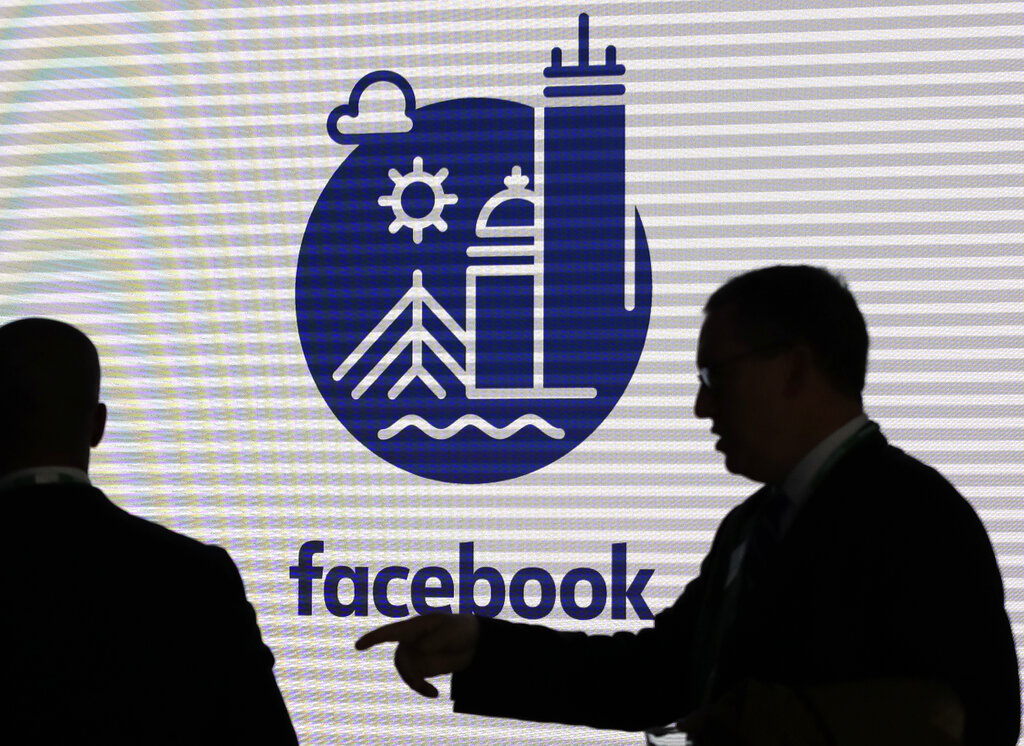
The companies said they have removed dozens of fake accounts and pages from their services.
Facebook Refuses to Ban Political Ads, Even False Ones
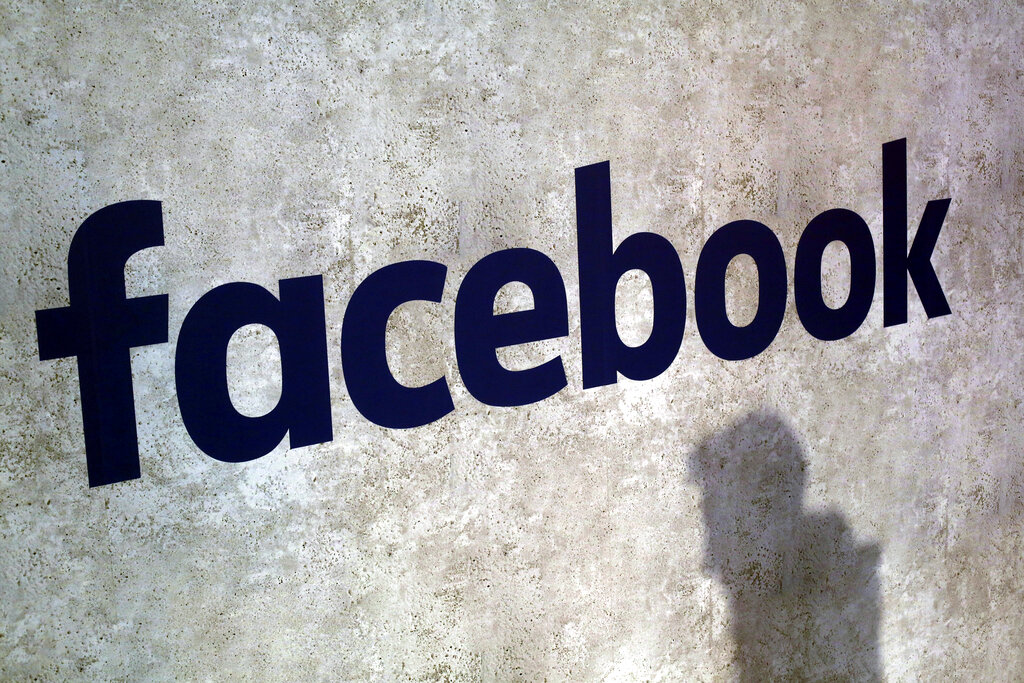
The decision follows action by Google and Twitter to restrict or ban political ads on their respective social media platforms.
From toast of town to toxic: Mark Zuckerberg on outs with democrats
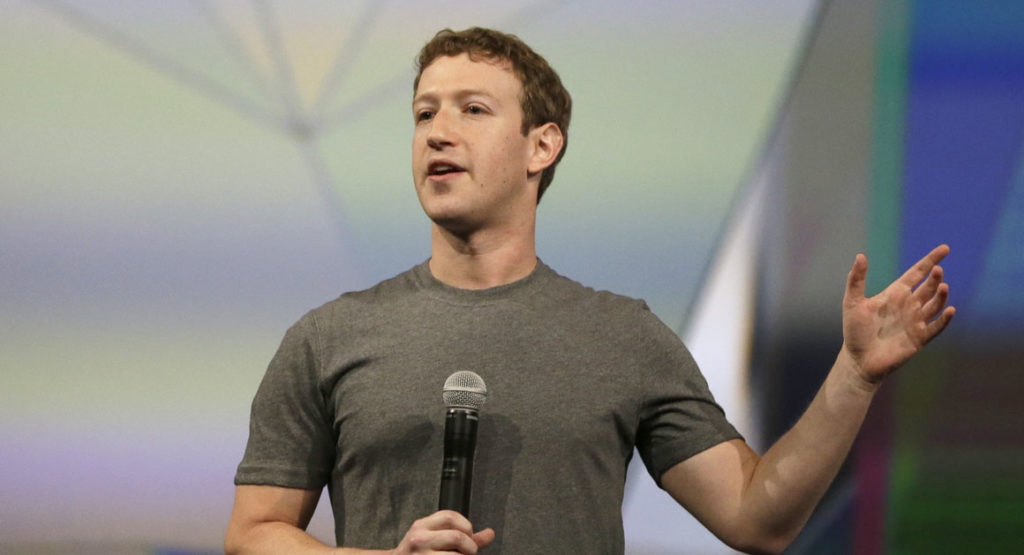
Mark Zuckerberg’s social network in Washington is shrinking. Bipartisan hostility against Facebook has been building for months, fueled by a series of privacy scandals, the site’s role in Russian meddling in the 2016 presidential campaign and accusations that Facebook crushes competitors. Now, with the 2020 elections approaching, Democrats especially are homing in on the conduct of the social media giant and its refusal to fact-check political ads and remove false ones. “When you’re the No. 1 monopoly, people are going to come after you,” says John Feehery, a veteran Republican communications strategist. The challenge for Democrats, as he sees it: “They’re facing a base that is very angry and restive. So they have to be much more aggressive in taking on corporations.” Zuckerberg enjoyed a cozy relationship with the Obama administration. But in the face of growing public outrage, the co-founder of the upstart born under the motto “Move fast and break things” is learning the art of smoothing over and piecing back together. His new strategy: a personal blitz featuring serial private meetings in Washington with key lawmakers of both parties and President Donald Trump; small, off-the-record dinners at his California home with conservative journalists and opinion makers; and the occasional public address or TV interview. Addressing criticisms from Democratic lawmakers and civil rights groups over Facebook’s track record on fighting discrimination, Zuckerberg and Chief Operating Officer Sheryl Sandberg planned to host a dinner Monday night with civil rights leaders. The two executives want to hear the leaders’ “direct perspective and feedback,” the company said. The Rev. Al Sharpton said last week that Zuckerberg would meet with him and others to discuss concerns such as Facebook’s handling of political messages. Misinformation on the platform can contribute to the suppression of voting by African Americans and other minorities, civil rights leaders say. Zuckerberg has become lobbyist-in-chief for a tech giant that has about 60 people officially playing that role. The company spent an estimated $12.6 million on federal influencing last year. The political ad issue hits close to home for Democrats. Facebook, as well as Twitter and Google, refused in September to remove a misleading video ad from Trump’s reelection campaign that targeted top-tier Democratic candidate Joe Biden. Sen. Elizabeth Warren, another top Democratic contender, chose to hit back by running her own ad and making it personal by falsely claiming that Zuckerberg had endorsed Trump for 2020. Warren, who has called for breaking up Facebook and other tech giants, acknowledged the ad’s deliberate falsity to make her point. Then came Zuckerberg’s speech last month at Georgetown University in which he promoted free expression as the foundation for Facebook’s refusal to take down content it deems newsworthy, even if the material violates company standards. The next week, during prickly questioning by Democratic lawmakers at a televised House hearing, Zuckerberg dug in on not fact-checking politicians’ speech and the handling of hate speech and potential incitements to violence. “This really is not about money,” Zuckerberg insisted. “It is important that people can see for themselves what politicians are saying.” Facebook says political advertising accounts for less than half of 1 percent of its total revenue. Separately from political advertising, Facebook has policies and improved technology that it says now enables it to more efficiently detect terrorist content in many languages. Following the mass shooting in New Zealand last spring, for example, Facebook now prohibits livestreaming by people who have violated rules covering organizations and individuals deemed dangerous and potentially violent. In the lambasting from Democrats, Rep. Joyce Beatty of Ohio, the vice chair of the Congressional Black Caucus, focused on Facebook’s track record on civil rights and diversity. She told Zuckerberg that he had “ruined the lives of many people, discriminated against them.” As part of a legal settlement with civil rights groups, Facebook changed its ad-targeting systems this year to prevent discrimination in housing, credit and employment ads. It previously had allowed such ads to be targeted to people based on age, sex or race, which is illegal. At some points, friendlier Republican members of the House Financial Services Committee asked Zuckerberg how he was holding up through the six-hour hearing. “I’m doing OK,” replied the 35-year-old co-founder, chairman and CEO. He’s one of the world’s richest individuals, with a net worth currently estimated at $71 billion. Summing up, Rep. Maxine Waters, the California Democrat who leads the committee, told Zuckerberg, “You have opened up a discussion about whether Facebook should be broken up.” A mandated breakup would be the worst-case scenario for Facebook and the other big tech companies. Facebook says splitting up large tech corporations would make the election system more vulnerable to interference because the companies wouldn’t be able to work together to prevent it. For Zuckerberg and the Democrats, “it may be a nasty divorce,” said James Thurber, a professor of government at American University who founded its Center for Congressional and Presidential Studies. “He clearly has taken a stand that’s really quite unpopular.” Thurber called Zuckerberg’s backstage celebrity approach to lobbying efforts “very dangerous.” “You’ve got to be very careful about that, if you think you can do it yourself,” he said. Rep. David Cicilline, a senior House Democrat who leads the Judiciary Committee’s investigation into the market dominance of big tech companies, is working on legislation that may target the profits made by Facebook from political ads it knows are false. The measure likely would also apply to social media rivals Twitter and Google. Last Wednesday, Twitter made the unexpected announcement that it will ban all political advertising from its service. “This is a good first step,” Cicilline tweeted. “Your move, Google/Facebook.” Zuckerberg’s quick riposte, during Facebook’s quarterly conference call on earnings, was to reaffirm the company’s commitment to the value of free speech, including for politicians. It’s a sharp reversal of fortune for Facebook from the days of the Obama administration, when the company was hailed as an exemplar of innovation and an engine of economic growth. Campaign money flowed to the
The pressure is now on Facebook to ban political ads
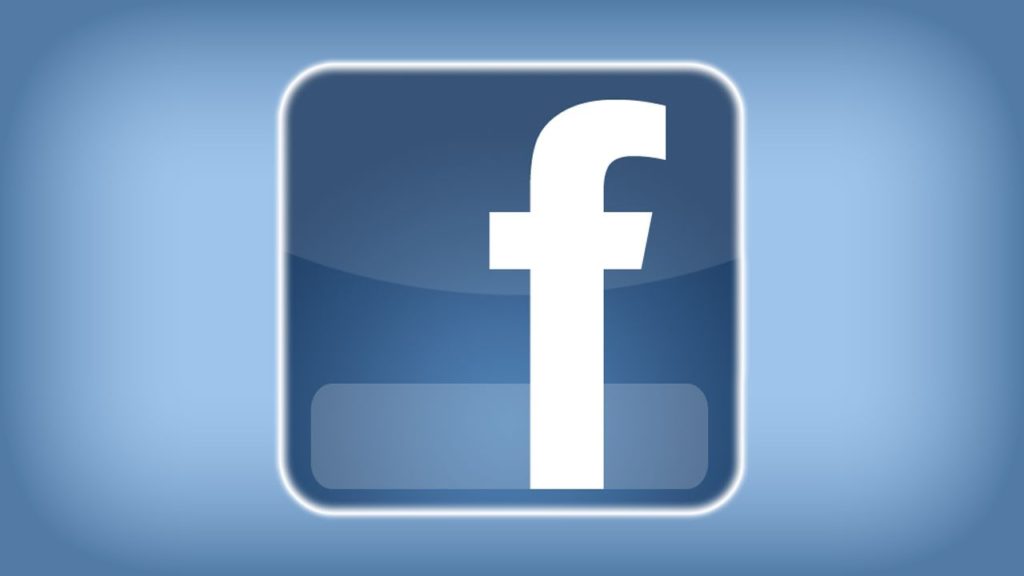
Twitter’s ban on political advertising is ratcheting up pressure on Facebook and Mark Zuckerberg to follow suit. But so far, that doesn’t appear likely to happen. Facebook’s policy is to accept paid political ads from candidates without fact-checking them or censoring them, even if they contain lies. And Zuckerberg doubled down on that stand Wednesday following Twitter’s announcement, reiterating that “political speech is important” and that Facebook is loath to interfere with it. Twitter, Facebook and other social media sites have come under fire over Russia’s use of such platforms to spread misinformation and sow political division in the U.S. during the 2016 presidential campaign. That debate has heated up again in recent weeks along with the 2020 race for the White house. Twitter chose to respond with a ban on all political advertising , suggesting that social media is so powerful that false or misleading messages pose a risk to democracy.The timing of the announcement, the same day as Facebook’s quarterly earnings report, seemed designed to goad Zuckerberg. “The pressure is going to be extremely strong on Facebook to do something similar, and if they don’t, the criticism of Facebook will only increase,” said Tim Bajarin, president of consultancy Creative Strategies. In fact, some of the Democratic presidential candidates immediately suggested Facebook follow Twitter’s lead. Montana Gov. Steve Bullock tweeted: “Good. Your turn, Facebook.” And Pete Buttigieg said, “I think other online platforms would do well to either accept their responsibility for truth or question whether they should be in the business at all.” But Zuckerberg stood firm. “This is complex stuff. Anyone who says the answer is simple hasn’t thought about the nuances and downstream challenges,” the Facebook CEO said. “I don’t think anyone can say that we are not doing what we believe or we haven’t thought hard about these issues.”As for refusing to fact-check political ads, Facebook has said it wants to provide politicians with a “level playing field” for communication and not intervene when they speak, regardless of what they’re saying. Banning political ads has its own challenges, starting with defining what exactly is political. For example, Greenpeace might not be able to buy an ad urging people to support legislation to fight climate change. But what if an oil company wanted to run an ad for its products that also seemed to come out against such legislation? Twitter and Facebook already take steps to prevent political manipulation by verifying the identities of political advertisers — measures prompted by the furor over Moscow’s interference. But the verifying systems, which rely on both humans and automated systems, have not been perfect. In one case, Facebook mistakenly took down ads for Bush’s baked beans because they contained the word “Bush” and the food company was not registered with Facebook as a political advertiser. Media organizations have also seen their ads flagged for review when they promoted news stories about candidates or important issues. And then there’s the question of what to do with individual posts from politicians or other opinion makers, which can carry political messages and be shared widely even though they are not paid ads. Details about Twitter’s new policy won’t be released until Nov. 15, a week before it takes effect. But Twitter does call for removing not just campaign advertisements but also ads on issues of legislative importance. That could include such topics as climate change, gun control and immigration. EMarketer analyst Debra Aho Williamson said Zuckerberg’s stance probably isn’t a financial decision, since political ads aren’t big moneymakers. Facebook, which had 2018 revenue of $55.8 billion, said Wednesday that it expects ads from politicians to account for less than 0.5% of its revenue next year. Twitter, which had revenue last year of about $3 billion, is thought to make even less from the ads; it said it brought in only $3 million from political ads during the 2018 midterms. “It is a really complicated decision,” Williamson said. “I think that Mark Zuckerberg is truly struggling with figuring out what is the best thing to do for the company and Facebook users.” Wedbush Securities managing director Michael Pachter likewise said the Facebook founder is trying to pull off a tricky balancing act. “Zuckerberg is trying to satisfy investors by growing revenues and satisfy regulators and legislators by cracking down on false and misleading ads, while maintaining the virtuous stance of being a defender of free speech,” Pachter said. Daniel Kreiss, a journalism professor at the University of North Carolina, said that a middle ground for Twitter and Facebook might be to allow political ads but to prohibit targeting, or showing them only to specific groups of people. If campaigns aren’t allowed to target, he said, messages will become broader and perhaps less misleading. Laura Packard, a partner at PowerThru, a digital consulting firm that works with left-of-center campaigns and advocacy groups, said Twitter’s ban was the right decision for voters.“This might make my work harder,” she said. “But in general, I think that if any platform cannot police misinformation and lies, then they shouldn’t offer paid advertising.” By Mae Anderson and Rachel Lerman AP Technology Writers AP reporter David Klepper in Providence, Rhode Island, contributed to this report. Mae Anderson reported from Atlanta. Republished with the permission of the Associated Press.
Facebook’s currency plan gets hostile reception in Congress
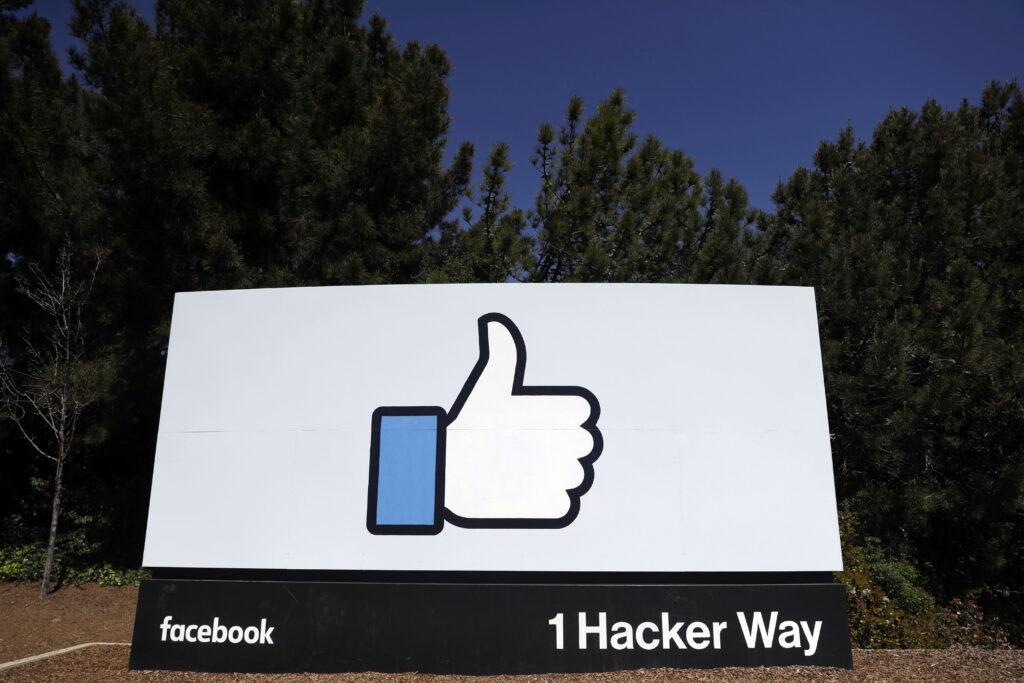
Under sharp criticism from senators, a Facebook executive on Tuesday defended the social network’s ambitious plan to create a digital currency and pledged to work with regulators to achieve a system that protects the privacy of users’ data. “We know we need to take the time to get this right,” David Marcus, the Facebook executive leading the project, told the Senate Banking Committee at a hearing. But that message did little to assure senators. Members of both parties demanded to know why a company with massive market power and a track record of scandals should be trusted with such a far-reaching project, given the potential for fraud, abuse and criminal activity. “Facebook is dangerous,” asserted Sen. Sherrod Brown of Ohio, the committee’s senior Democrat. Like a toddler playing with matches, “Facebook has burned down the house over and over,” he told Marcus. “Do you really think people should trust you with their bank accounts and their money?” Republican Sen. Martha McSally of Arizona said “the core issue here is trust.” Users won’t be able to opt out of providing their personal data when joining the new digital wallet for Libra, McSally said. “Arizonans will be more likely to be scammed” using the currency, she said. The litany of criticism came as Congress began two days of hearings on the currency planned by Facebook, to be called Libra. Meanwhile, a House Judiciary subcommittee extended its bipartisan investigation of the market power of Facebook, Google, Amazon and Apple. On the defensive from bursts of aggressive questioning, Facebook’s Marcus indicated the currency plan is a work in progress. “We will take the time” to ensure the network won’t be open to use by criminals and illicit activity like money laundering and financial fraud. “We hope that we’ll avoid conflicts of interest. We have a lot of work to do,” Marcus said. He said the new venture would be headquartered in Switzerland, not to avoid oversight but because the country is a recognized international financial center. The grilling followed a series of negative comments and warnings about the Libra plan in recent days from President Donald Trump, his treasury secretary and the head of the Federal Reserve. But some senators emphasized the potential positive benefits of Facebook’s plan, meant to bring money transacting at low cost to millions around the globe who don’t have bank accounts. Facebook had its strong defenders of the project, too, on the panel. “To strangle this baby in the crib is wildly premature,” said Sen. Pat Toomey, Republican-Pennsylvania. In that vein, Marcus said Libra “is about developing a safe, secure and low-cost way for people to move money efficiently around the world. We believe that Libra can make real progress toward building a more inclusive financial infrastructure.” The planned digital currency is to be a blend of multiple currencies, so that its value will fluctuate in any given local currency. Because Libra will be backed by a reserve, and because the group of companies managing it will encourage a competitive system of exchanges, the project leaders say, “anyone with Libra has a high degree of assurance they can sell it for local (sovereign) currency based on an exchange rate.” Promising low fees, the new currency system could open online commerce to millions of people around the world who lack access to bank accounts and make it cheaper to send money across borders. But it also raises concerns over the privacy of users’ data and the potential for criminals to use it for money laundering and fraud. To address privacy concerns, Facebook created a nonprofit oversight association, with dozens of partners including PayPal, Uber, Spotify, Visa and MasterCard, to govern Libra. As one among many in the association, Facebook says it won’t have any special rights or privileges. It also created a “digital wallet” subsidiary, Calibra, to work on the technology, separately from its main social media business. While Facebook owns and controls Calibra, it won’t see financial data from it, the company says. Senators demanded to know exactly what that separation will entail. “Facebook isn’t a company; it’s a country,” said Sen. John Kennedy, Republican-Louisiana. Kennedy and other conservative senators took the occasion to air long-standing grievances against Facebook, Twitter and Google for a perceived bias against conservative views. Facebook’s currency proposal has also faced heavy skepticism from the Trump administration. Trump tweeted last week that the new currency, Libra, “will have little standing or dependability.” Both Treasury Secretary Steven Mnuchin and Fed Chair Jerome Powell have expressed serious concerns recently that Libra could be used for illicit activity. The Treasury Department has “very serious concerns that Libra could be misused by money launderers and terrorist financers,” Mnuchin told reporters at the White House on Monday. “This is indeed a national security issue.” Also Tuesday, across the Capitol in the House, the chairman of a Judiciary Committee panel investigating the market power of big tech companies said Congress and antitrust regulators wrongly allowed them to regulate themselves. That enabled companies like Facebook, Google, Amazon and Apple to operate out of control, dominating the internet and choking off online innovation, Rep. David Cicilline, Democrat-Rhode Island, said at the start of a hearing. “The internet has become increasingly concentrated, less open, and growingly hostile to innovation and entrepreneurship,” he said. As concerns have mounted over data privacy and market dominance of Big Tech, an increasing number of lawmakers from both parties are calling for tighter regulation of customarily free-wheeling companies or even breaking them up. The Justice Department and the Federal Trade Commission are pursuing antitrust investigations of the four major companies. Executives of the companies, testifying at the Judiciary hearing, pushed back against lawmakers’ accusations that they operate as monopolies, laying out ways in which they say they compete fairly yet vigorously against rivals in the marketplace. And Google executive Karan Bhatia, at a Senate Judiciary subcommittee hearing on online bias, insisted that the company’s search engine does not filter on the basis of political views. “We surface the
Facebook’s election ‘war room’ takes aim at fake information
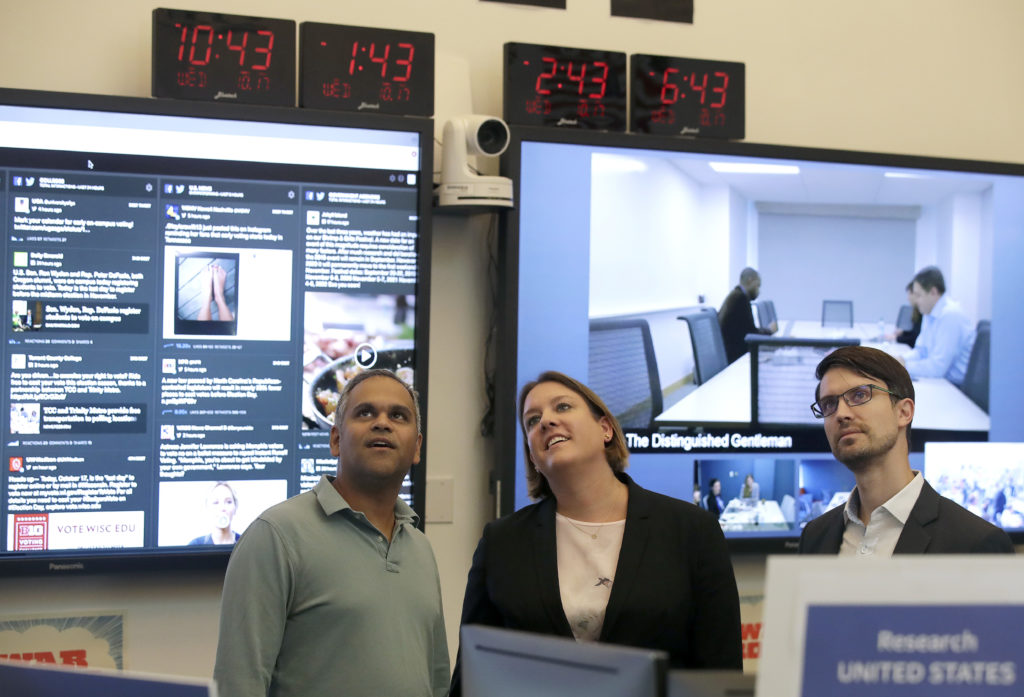
In an otherwise innocuous part of Facebook’s expansive Silicon Valley campus, a locked door bears a taped-on sign that reads “War Room.” Behind the door lies a nerve center the social network has set up to combat fake accounts and bogus news stories ahead of upcoming elections. Inside the room are dozens of employees staring intently at their monitors while data streams across giant dashboards. On the walls are posters of the sort Facebook frequently uses to caution or exhort its employees. One reads, “Nothing at Facebook is somebody else’s problem.” That motto might strike some as ironic, given that the war room was created to counter threats that almost no one at the company, least of all CEO Mark Zuckerberg, took seriously just two years ago — and which the company’s critics now believe pose a threat to democracy. Days after President Donald Trump‘s surprise victory, Zuckerberg brushed off assertions that the outcome had been influenced by fictional news stories on Facebook, calling the idea “pretty crazy .” But Facebook’s blase attitude shifted as criticism of the company mounted in Congress and elsewhere. Later that year, it acknowledged having run thousands of ads promoting false information placed by Russian agents. Zuckerberg eventually made fixing Facebook his personal challenge for 2018. The war room is a major part of Facebook’s ongoing repairs. Its technology draws upon the artificial-intelligence system Facebook has been using to help identify “inauthentic” posts and user behavior. Facebook provided a tightly controlled glimpse at its war room to The Associated Press and other media ahead of the second round of presidential elections in Brazil on Oct. 28 and the U.S. midterm elections on Nov. 6. “There is no substitute for physical, real-world interaction,” said Samidh Chakrabarti, Facebook’s director of elections and civic engagement. “The primary thing we have learned is just how effective it is to have people in the same room all together.” More than 20 different teams now coordinate the efforts of more than 20,000 people — mostly contractors — devoted to blocking fake accounts and fictional news and stopping other abuses on Facebook and its other services. As part of the crackdown, Facebook also has hired fact checkers, including The Associated Press, to vet new stories posted on its social network. Facebook credits its war room and other stepped-up patrolling efforts for booting 1.3 billion fake accounts over the past year and jettisoning hundreds of pages set up by foreign governments and other agents looking to create mischief. But it remains unclear whether Facebook is doing enough, said Angelo Carusone, president of Media Matters For America, a liberal group that monitors misinformation. He noted that the sensational themes distributed in fictional news stories can be highly effective at keeping people “engaged” on Facebook — which in turn makes it possible to sell more of the ads that generate most of Facebook’s revenue. “What they are doing so far seems to be more about trying to prevent another public relations disaster and less so about putting in meaningful solutions to the problem,” Carusone said. “On balance, I would say they that are still way off.” Facebook disagrees with that assessment, although its efforts are still a work in progress. Chakrabarti, for instance, acknowledged that some “bugs” prevented Facebook from taking some unspecified actions to prevent manipulation efforts in the first round of Brazil’s presidential election earlier this month. He declined to elaborate. The war room is currently focused on Brazil’s next round of elections and upcoming U.S. midterms. Large U.S. and Brazilian flags hang on opposing walls and clocks show the time in both countries. Facebook declined to let the media scrutinize the computer screens in front of the employees, and required reporters to refrain from mentioning some of the equipment inside the war room, calling it “proprietary information.” While on duty, war-room workers are only allowed to leave the room for short bathroom breaks or to grab food to eat at their desks. Although no final decisions have been made, the war room is likely to become a permanent fixture at Facebook, said Katie Harbath, Facebook’s director of global politics and government outreach. “It is a constant arms race,” she said. “This is our new normal.” Republished with permission from the Associated Press.
Perhaps Alabama’s most transparent leader, John Merrill, allows you to digitally stalk him
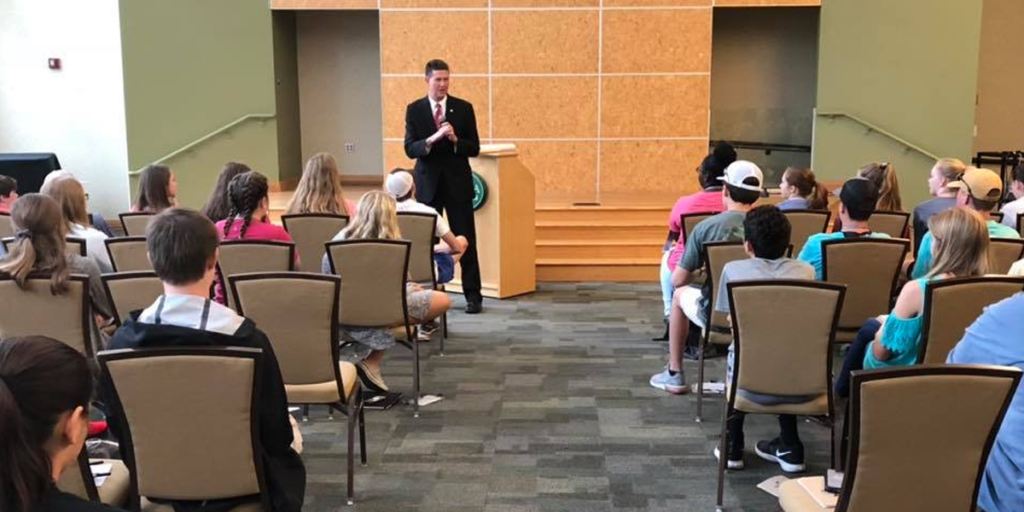
When it comes to connecting with the people of Alabama, there’s one statewide leader who goes above and beyond the call of duty to ensure he is as transparent and accessible as possible. The Alabama Secretary of State, John Merrill, not only fulfills his duties of office, but he also goes to great lengths to connect with those he serve. The proof? His Facebook page. On a daily basis Merrill takes to the social media platform to post public snaps of everyone he’s meeting with in the State Capitol and at events across the state. His daily updates are not only transparent, but seem to serve as a digital diary of his efforts in the Secretary of State’s office that he welcomes constituents to follow along. Here’s a look at this past week: Saturday Sunday Monday Tuesday Wednesday Thursday Friday The office of Secretary of State The Alabama Secretary of State is the Chief Clerk of the state and acts as the primary custodian of important state records. These records include business registrations, legislative acts, land records, campaign finance records, trademarks, and more. In addition to keeping the Great Seal of the State, the Secretary of State is the state’s Chief Election Officer, responsible for running and recording the results of all state elections.
Daniel Sutter: Is Facebook really like Ma Bell?
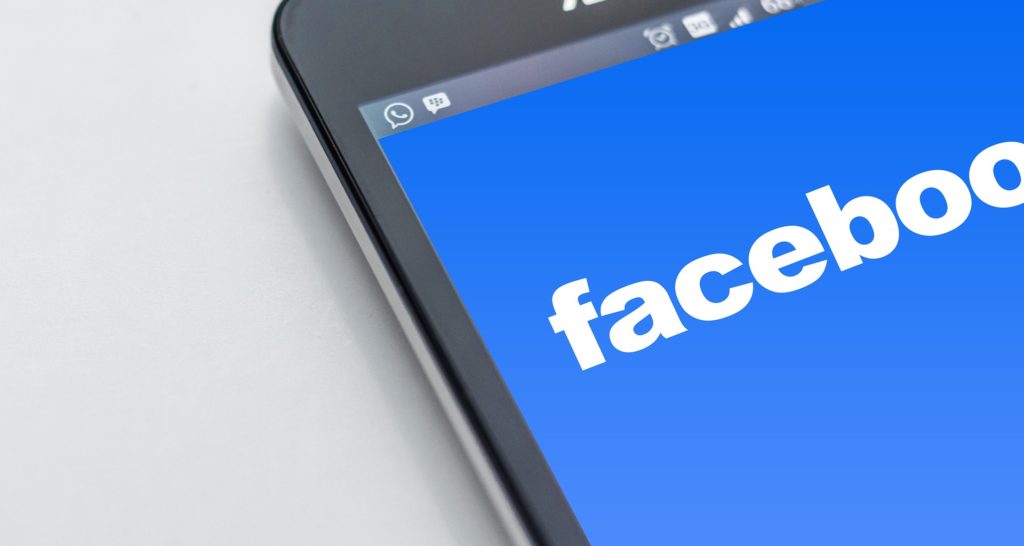
Some commentators and politicians have proposed regulating Facebook, Twitter, and Google as public utilities. To make sense of this proposal, let’s consider the economic role of public utilities. Today’s social media giants might meet the popular definition of monopoly, namely having a very large market share. Economists, however, use a much stricter definition, and public utility regulation is applied only to the specific type known as a “natural” monopoly. Natural monopoly refers to industries where the cost per unit produced or customer served falls due to a very high first unit cost and a very low cost of serving extra customers. Consider the electric grid. Establishing the grid requires generation plants, transmission lines, substations, and finally the power wires in our communities. Once built, the cost of connecting one more home or business to the grid is very low. The same dynamic applies to water and sewer systems, landline telephones, and roads and streets. One large firm will likely dominate such industries. Why? Competition drives price down to the cost of production. Here the largest firm has a cost advantage and can profitably charge lower prices than its rivals. Smaller firms can either match the leader’s price and lose money or maintain a profitable price and likely lose customers. After the smaller guys go bankrupt, the large firm can raise its price and earn big profits. We frequently use anti-trust laws to prevent the establishment of or to break up existing monopolies. But breaking up a natural monopoly is unlikely to produce competition for long. The largest firm’s cost advantage doesn’t go away. What are the alternatives? One is government ownership of the utility, which we rely on for water, sewers, roads, and electricity in communities like Troy. Cooperative ownership by customers – electric and natural gas co-ops – prevents managers from trying to profit at customers’ expense. Public utilities regulation gives a private, for-profit company an exclusive service territory, albeit with restrictions. Government regulators, in Alabama the Public Service Commission, set prices and other terms of service. And the utility is a common carrier who must provide service to all customers willing to pay the regulated price. Economists and lawyers developed the public utilities doctrine around 1900. Another way to think about a public utility is that competition between profit-seeking businesses normally best serves customers. But the enormous cost of power grids renders multiple systems and competition unattractive. Perhaps having one grid and economists deliver the benefits of competition through rules makes more sense. Whether the public utilities doctrine served America well during the 20th Century is a question for another day. How about applying this model to social media today? Facebook and Google meet the popular definition of monopoly – they dominate their markets. Twitter dominates its unique product, but alternatives exist to push out messages. None of the three has a massive, critical physical infrastructure creating declining cost per customer. The social media giants do possess an advantage resembling natural monopoly. They have coordination value: the value of being on Facebook increases with the number of other users. Economists call this a network effect. Although many economists fear that network effects might lock us into inferior technology, in practice entrepreneurs can get consumers to switch: we do not still watch VHS movies and listen to cassettes. The social media companies serve their customers very well. For instance, YouTube’s advertising allows performers to earn money, with some stars earning millions per year. Facebook has offered users innovative features and an easy interface. Market domination due to better service benefits consumers. Alternatives to Facebook currently exist, like LinkedIn and even MySpace. More significantly, a new rival would not have to duplicate a massively costly physical infrastructure. The economic case for regulating the fast-changing digital world with a model designed for the physical world is weak. Today’s social media giants will likely have a much shorter time on our economic stage than phone and electric utilities unless we cement their positions via regulation. ••• Daniel Sutter is the Charles G. Koch Professor of Economics with the Manuel H. Johnson Center for Political Economy at Troy University and host of Econversations on TrojanVision. The opinions expressed in this column are the author’s and do not necessarily reflect the views of Troy University.
Facebook, Twitter defend efforts to stop election meddling
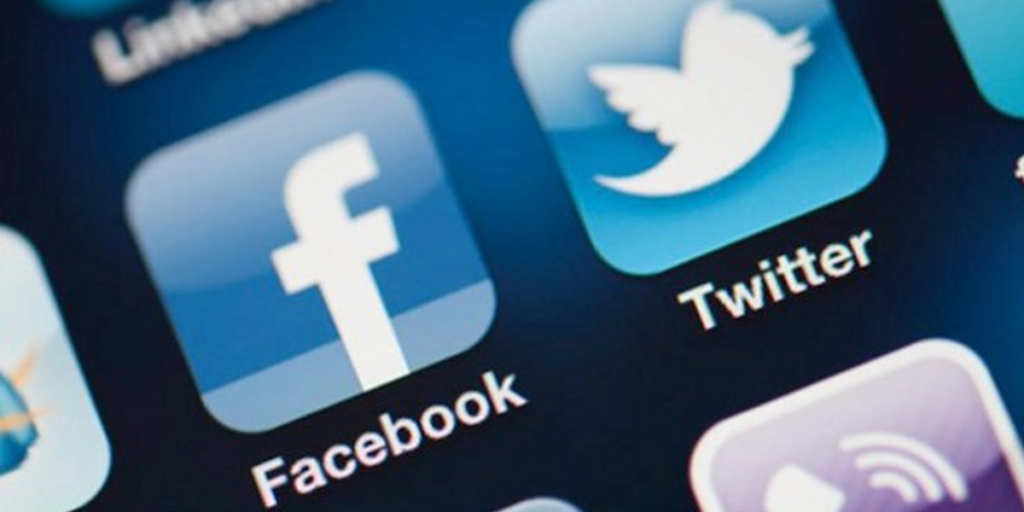
Facebook and Twitter executives, defending their companies on Capitol Hill, said Wednesday they are aggressively trying to root out foreign interests seeking to sow divisions in American democracy as the November elections near. Facebook’s No. 2 executive, Sheryl Sandberg, and Twitter’s CEO, Jack Dorsey, testified before the Senate intelligence committee, but there was an empty chair in place for Google’s parent Alphabet, which refused to send its top executive. Sandberg told senators that Facebook was “more determined” than adversaries trying to meddling in the upcoming elections, and she called the fight an “arms race,” as Facebook CEO Mark Zuckerberg has in the past. Dorsey was to appear later before a House committee amid complaints from Republicans that social media companies have shown evidence of bias against conservatives. In testimony released before that hearing, Dorsey denied that Twitter uses political ideology to make decisions. Congress has criticized the companies over the past year as Russia’s interference in the 2016 elections and beyond became clear. That scrutiny has led to additional criticism over the companies’ respect for user privacy and whether conservatives are being censored. “The companies have made progress, the government has made progress, but the bad guys have made progress as well,” said Virginia Sen. Mark Warner, the top Democrat on the Senate committee. Warner has proposed ways that the companies could be regulated for the first time. The later hearing before the House Energy and Commerce Committee was to focus on bias and Twitter’s algorithms. Some Republicans, including President Donald Trump, have pushed the idea that Twitter is “shadow banning” some in the GOP because of the ways search results have appeared. Twitter denies that’s happening. Absent from the Senate’s questioning was Google. The committee invited Larry Page, the CEO of Google’s parent company, Alphabet, but the company said it would send a lower-ranking executive instead. The committee rejected that offer. The committee chairman, Sen. Richard Burr, R-N.C., said Google doesn’t “understand the problem” if it doesn’t want to work with the government to find solutions. The back-and-forth with Google is the latest in a year’s worth of attempts by Congress to force the companies to focus more sharply on the Russian interference issue. While Burr said he believes Facebook and Twitter do understand the problem, it took both companies several months last year to acknowledge they had been manipulated. The companies have made many policy changes, and have caught and banned malicious accounts over the past year. Still, their business models — free services that rely on attracting as many users as possible for as long as possible and finding out as much about them as possible — remain the same. Sandberg, in her prepared remarks, detailed how Facebook was addressing the problem but reiterated that the company was slow to spot it. Thirteen Russians were indicted by special counsel Robert Mueller this year on charges of an elaborate plot to disrupt the 2016 U.S. presidential election by creating fake accounts that pushed divisive issues on social media. Dorsey said Twitter has continued to identify accounts that may be linked to the same Russian internet agency as identified in Mueller’s indictment. He said Twitter has so far suspended 3,843 accounts the company believes are linked to the agency, and has seen recent activity. On bias, the Twitter CEO said in prepared testimony before his second hearing that “”Twitter does not use political ideology to make any decisions, whether related to ranking content on our service or how we enforce our rules.” Only Dorsey was invited to the House hearing after specific Republican concerns about bias on Twitter. While all three tech companies have been accused of political bias against conservatives, the more public-facing nature of Twitter has made it an especially easy target. Republished with permission from the Associated Press.
Donald Trump says he ‘won’t let’ social media target conservatives
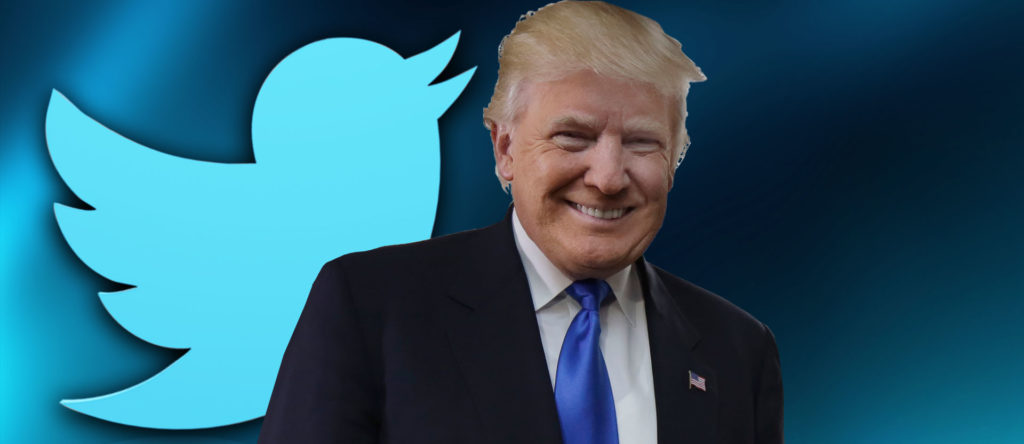
President Donald Trump is accusing social media companies of “totally discriminating against Republican/Conservative voices” and says “we won’t let that happen.” Trump’s Saturday morning tweets come as companies have been working to ban right-wing “Infowars” conspiracy theorist Alex Jones from their platforms. Apple, YouTube and Spotify have permanently removed some of his content, Facebook has suspended him for 30 days and removed some of his pages, while Twitter has given Jones a weeklong timeout and is mulling deeper changes to try to limit the spread of fake news, misinformation and hate speech. Trump did not mention Jones by name in his tweets, which complained that, “Too many voices are being destroyed, some good & some bad.” Trump appeared on Jones’ program during the 2016 campaign and praised his “amazing” reputation. Republished with the permission of the Associated Press.


